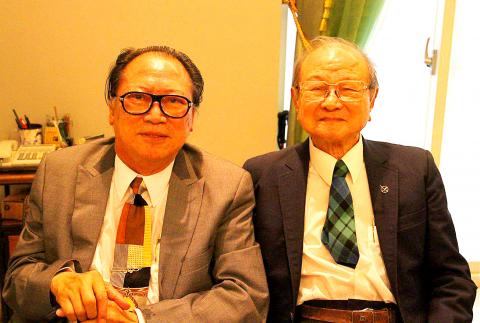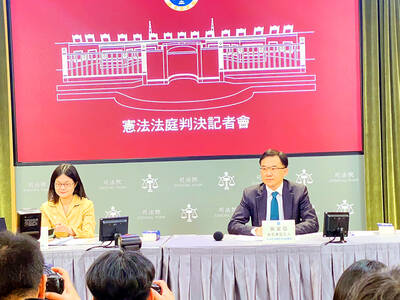Prominent Taiwanese composer Tyzen Hsiao (蕭泰然) passed away at his residence in Los Angeles, California, on Tuesday morning at the age of 77 from multiple organ failure after battling lung cancer for two years.
Hsiao’s son, Joseph Hsiao (蕭傑仁), yesterday confirmed the news on Facebook, saying: “My father, is now in heaven today as of 9:10am. No more pain and suffering.”
The post also called on the public and media not to disturb him with calls, as he still needed time to grieve.

Photo courtesy of the Tyzen Hsiao Culture and Education Foundation
Known as “Taiwan’s Rachmaninoff,” after legendary Russian composer and pianist Sergei Rachmaninov, Tyzen Hsiao was born in Kaohsiung on Jan. 1, 1938.
He studied music at National Taiwan Normal University and Musashino Academia Musicae before relocating to the US in 1977.
Tyzen Hsiao was known primarily for his efforts to “use the spirit of Taiwanese folk melody as the core and meld it into the classical, romantic, impressionistic and modern styles of music to form the basis for the neo-Taiwanese music style.”
His works include three concertos, composed from 1988 to 1990: 1947 Overture (一九四七序曲), composed in memory of the 228 Incident; Love Taiwan (嘸通嫌台灣), a piece which many believe caused Tyzen Hsiao to be blacklisted by the Chinese Nationalist Party (KMT) government; and Formosan Angels (福爾摩莎的天使).
The 228 Incident refers to an uprising that began on Feb. 27, 1947, against the authoritarian KMT regime of the time and the resulting brutal crackdown that left tens of thousands dead and led to nearly four decades of martial law.
Despite being diagnosed with lung cancer after a visit to Taiwan in 2012, Tyzen Hsiao nonetheless made several appearances last year at multiple concerts held in his name in the US, and helped the Taiwan Center Foundation of Greater Los Angeles raise funds for their events.
Many of Tyzen Hsiao’s friends in Los Angeles said they were sad to hear the news of his passing.
The Shepherds of the Valley Presbyterian Church in Hacienda Heights, Los Angeles, also said it would hold a memorial service for him on March 14.
Minister of Culture Hung Meng-chi (洪孟啟) expressed his sadness upon hearing of Tyzen Hsiao’s passing, and said the ministry was already in the process of applying for an official commendation for him.
Tyzen Hsiao completed nearly 100 compositions, including concertos and symphonies, and his influence would continue to resonate among music lovers for years, Hung said.
Democratic Progressive Party Chairperson Tsai Ing-wen (蔡英文) posted on Facebook her sadness at hearing of the composer’s passing.
His works will become an asset that all Taiwanese will have in common, Tsai wrote, adding that it was also due to his efforts that many folk melodies in the nation had become popular overseas.
“Taiwan is not absent on the ethnic musical map; may he rest in peace,” Tsai wrote.
Taipei Department of Information and Tourism Commissioner Chien Yu-yen (簡余晏) said the nation needed a song to “help us coalesce our mutual historical memories,” after posting a recording of Taiwan the Green (台灣翠青), which is regarded by Taiwan independence supporters as a candidate for the national anthem.
Taiwan the Green is a poem written by the late John Jyigiokk (鄭兒玉), a Taiwan Presbyterian Church pastor and professor at Tainan Theological College and Seminary. Tyzen Hsiao set to music in 1988.
Additional reporting by CNA
This story has been amended since it was first published.

The US government has signed defense cooperation agreements with Japan and the Philippines to boost the deterrence capabilities of countries in the first island chain, a report by the National Security Bureau (NSB) showed. The main countries on the first island chain include the two nations and Taiwan. The bureau is to present the report at a meeting of the legislature’s Foreign Affairs and National Defense Committee tomorrow. The US military has deployed Typhon missile systems to Japan’s Yamaguchi Prefecture and Zambales province in the Philippines during their joint military exercises. It has also installed NMESIS anti-ship systems in Japan’s Okinawa

TRAGEDY STRIKES TAIPEI: The suspect died after falling off a building after he threw smoke grenades into Taipei Main Station and went on a killing spree in Zhongshan A 27-year-old suspect allegedly threw smoke grenades in Taipei Main Station and then proceeded to Zhongshan MRT Station in a random killing spree that resulted in the death of the suspect and two other civilians, and seven injured, including one in critical condition, as of press time last night. The suspect, identified as a man surnamed Chang Wen (張文), allegedly began the attack at Taipei Main Station, the Taipei Fire Department said, adding that it received a report at 5:24pm that smoke grenades had been thrown in the station. One man in his 50s was rushed to hospital after a cardiac arrest

ON ALERT: Taiwan’s partners would issue warnings if China attempted to use Interpol to target Taiwanese, and the global body has mechanisms to prevent it, an official said China has stationed two to four people specializing in Taiwan affairs at its embassies in several democratic countries to monitor and harass Taiwanese, actions that the host nations would not tolerate, National Security Bureau (NSB) Director-General Tsai Ming-yen (蔡明彥) said yesterday. Tsai made the comments at a meeting of the legislature’s Foreign Affairs and National Defense Committee, which asked him and Minister of National Defense Wellington Koo (顧立雄) to report on potential conflicts in the Taiwan Strait and military preparedness. Democratic Progressive Party (DPP) Legislator Michelle Lin (林楚茵) expressed concern that Beijing has posted personnel from China’s Taiwan Affairs Office to its

‘ILLEGAL RULING’: The KMT and the TPP slammed the Constitutional Court judgement, saying it contravened the law and was trying to clear the way for a ‘green dictatorship’ The Constitutional Court yesterday ruled that amendments to the Constitutional Court Procedure Act (憲法訴訟法) passed by the Legislative Yuan last year are unconstitutional, as they contravene due legislative process and separation of powers. The Legislative Yuan on Dec. 20 last year passed amendments stipulating that no fewer than 10 grand justices must take part in deliberations of the Constitutional Court, and at least nine grand justices must agree to declare a law unconstitutional. The Executive Yuan on Jan. 2 requested that lawmakers reconsider the bill, but the Legislative Yuan, under a combined majority of Chinese Nationalist Party (KMT) and Taiwan People’s Party